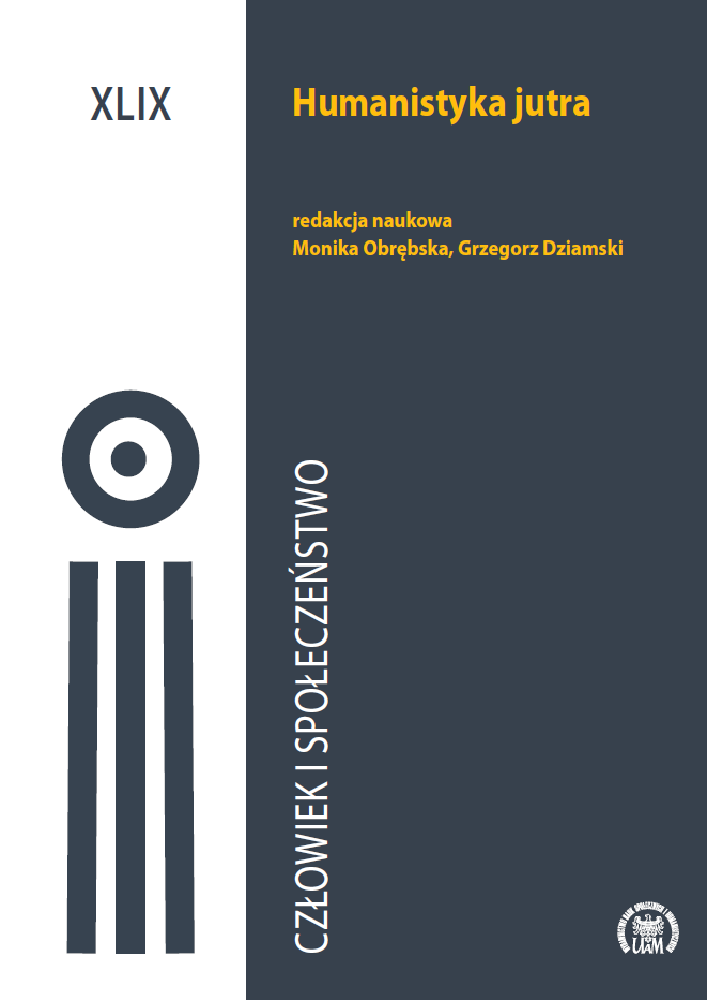Abstrakt
The aim of the article is to present the basic idea of academic tutoring. This method allows for personalized and in-depth use of experience – based and taught teaching tools by developed in modern humanities in academic teaching.
Bibliografia
Brzezińska, A. (2000). Psychologia wychowania. W: J. Strelau (red.), Psychologia. Podręcznik akademicki (s. 223–253), t. 3. Sopot: Gdańskie Wydawnictwo Psychologiczne.
Brzezińska, A., Rycielska, L. (2009). Tutoring jako czynnik rozwoju ucznia i nauczyciela. W: M. Budzyński, J. Traczyński, P. Czekierda, Z. Zalewski, A. Zembrzuska (red.), Tutoring w szkole. Między praktyką a teorią zmiany edukacyjnej (s. 19–30). Wrocław: TEO.
Clark, J. (2001). The Oxford tutorial: The students’ perspective. W: D. Palfreyman (red.), The Oxford Tutorial:’Thanks, you taught me how to think’. Oxford: Oxford Centre for Higher Education Policy Studies.
Czekierda, P. (2009). Co możemy zyskać w perspektywie społecznej, wprowadzając tutoring do szkoły? W: M. Budzyński, J. Traczyński, P. Czekierda, Z. Zalewski, A. Zembrzuska (red.), Tutoring w szkole. Między praktyką a teorią zmiany edukacyjnej (s. 15–18). Wrocław: TEO.
Czekierda, P. (2015). Czym jest tutoring? W: P. Czekierda, B. Fingas, M. Szala (red.), Tutoring. Teoria. Praktyka. Studia przypadków (s. 15–36). Warszawa: Wolters Kluwer.
Dawkins, R. (2008). Evolution in biology tutoring. W: D. Palfreyman (red.), The Oxford Tutorial:’Thanks, you taught me how to think’. Oxford: Oxford Centre for Higher Education Policy Studies.
Fingas, B. (2015). Fundamenty i źródła tutoringu. W: P. Czekierda, B. Fingas, M. Szala (red.), Tutoring. Teoria. Praktyka. Studia przypadków (s. 37–61). Warszawa: Wolters Kluwer.
Fox, L. (2008). Tutorials in greats and history: The Socratic method. W: D. Palfreyman (red.), The Oxford Tutorial:’Thanks, you taught me how to think’. Oxford: Oxford Centre for Higher Education Policy Studies.
Godlewski, D. (2015). Tutoring nie jest tani: dlaczego się opłaca i jak go finansować? W: P. Czekierda, B. Fingas, M. Szala (red.), Tutoring. Teoria. Praktyka. Studia przypadków (s. 89–111). Warszawa: Wolters Kluwer.
Mirfield, P. (2008). Teaching law, learning law: Growing up intellectually. W: D. Palfreyman (red.), The Oxford Tutorial:’Thanks, you taught me how to think’. Oxford: Oxford Centre for Higher Education Policy Studies.
Palfreyman, D. (2008). Higher education, liberal education, critical-thinking, academic discourse, and the Oxford tutorial as sacred cow or pedagogical gem. W: D. Palfreyman (red.), The Oxford Tutorial:’Thanks, you taught me how to think’. Oxford: Oxford Centre for Higher Education Policy Studies.
Pearson, R. (2008). Modern linguists as multi-taskers. W: D. Palfreyman (red.), The Oxford Tutorial:’Thanks, you taught me how to think’. Oxford: Oxford Centre for Higher Education Policy Studies.
Probert, P. (2008). Engineering the tutorial experience. W: D. Palfreyman (red.), The Oxford Tutorial:’Thanks, you taught me how to think’. Oxford: Oxford Centre for Higher Education Policy Studies.
Szala, M. (2015). Praca tutorska i proces stawania się tutorem. W: P. Czekierda, B. Fingas, M. Szala (red.), Tutoring. Teoria. Praktyka. Studia przypadków (s. 62–88). Warszawa: Wolters Kluwer.
Licencja
1. W momencie złożenia pracy celem rozpoczęcia postępowania w sprawie publikacji, Licencjodawca, zwany dalej Autorem, akceptuje wszystkie zasady umieszczone na stronie internetowej czasopisma “Człowiek i Społeczeństwo”, udzielając Licencjobiorcy, zwanego dalej Wydawcą, niewyłącznej i nieodpłatnej licencji na korzystanie z Utworu. Licencja zakłada tym samym brak ograniczeń terytorialnych, czasowych oraz ilościowych na następujących polach eksploatacji (art. 50 ustawy z dnia 4 lutego 1994 r. o prawie autorskim i prawach pokrewnych):
a. utrwalanie Utworu;
b. zwielokrotnienie Utworu drukiem i w wersji cyfrowej;
c. wprowadzenie do obrotu, użyczenie lub najem oryginału/zwielokrotnionych egzemplarzy Utworu;
d. publiczne wykonanie, wystawienie, wyświetlenie, odtworzenie oraz nadawanie i reemitowanie, a także publiczne udostępnianie Utworu w taki sposób, aby każdy mógł mieć do niego dostęp w miejscu i w czasie przez siebie wybranym;
e. włączenie Utworu w skład utworu zbiorowego;
f. wprowadzenie Utworu w postaci elektronicznej na platformy elektroniczne lub inne wprowadzenie Utworu w postaci elektronicznej do Internetu, Intranetu, Extranetu lub innej sieci;
g. rozpowszechnianie Utworu w wersji elektronicznej w Internecie, Intranecie, Extranecie lub innej sieci, w pracy zbiorowej, a także samodzielnie w formule Open Access w oparciu o licencję Creative Commons Uznanie autorstwa 4.0 Międzynarodowa Licencja Publiczna (CC BY 4.0), a także inną wersję językową tej licencji, lub którąkolwiek późniejszą wersję tej licencji.
2. Założenia licencji Creative Commons Uznanie autorstwa 4.0 Międzynarodowa Licencja Publiczna (CC BY 4.0), udzielają Wydawcy upoważnienia do kopiowania, zmieniania, rozprowadzania, przedstawiania i wykonywania Utworu jedynie pod warunkiem uznania autorstwa.
3. Wraz z dostarczeniem Utworu, Autor zobowiązuje się do wypełnienia, podpisania oraz odesłania skanu umowy

